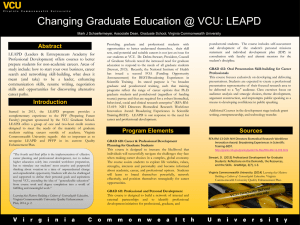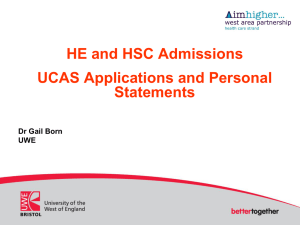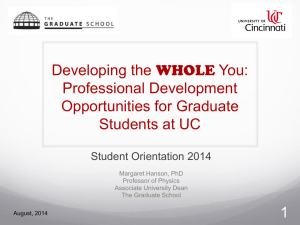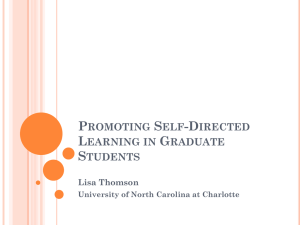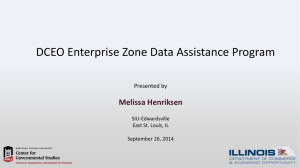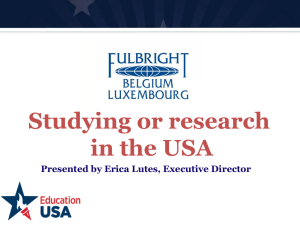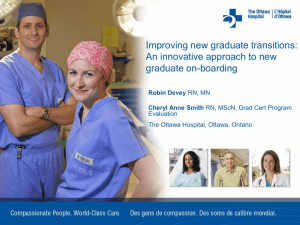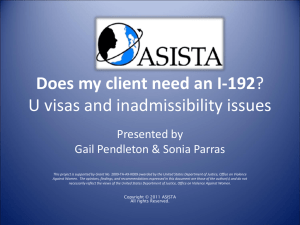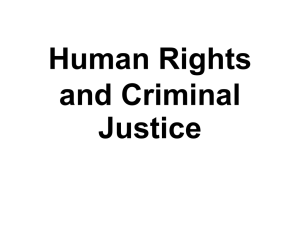FHDDRA Fellowship ppt - The University of Arizona Graduate College
advertisement
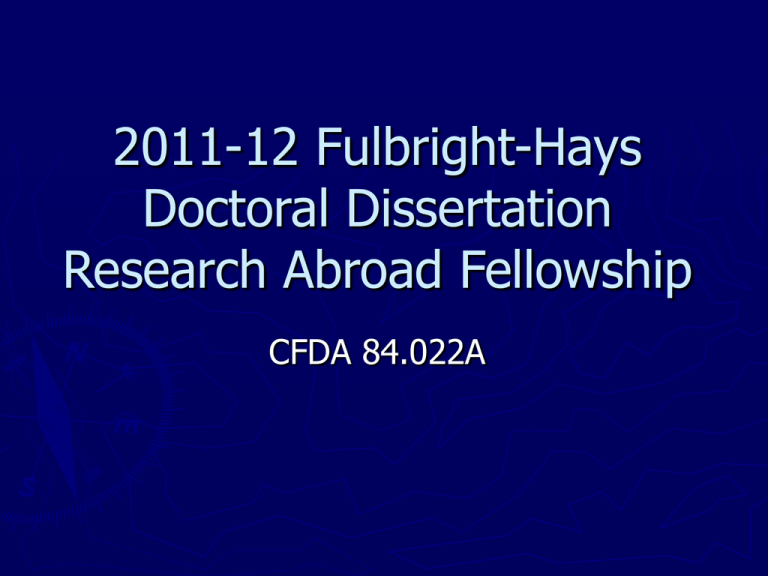
2011-12 Fulbright-Hays Doctoral Dissertation Research Abroad Fellowship CFDA 84.022A Overview ► Eligibility and Conditions ► The Process ► Preliminary Schedule & Deadlines ► Reviewer Comments ► Writing a Great Proposal ► Tips/Advice from Fellows ► Accepting & Activating the Grant 2 F-H DDRA Purpose Contributes to the development and improvement of the study of modern foreign languages and area studies in the U.S. by supporting full-time dissertation research abroad. Area studies – comprehensive study of society or societies, including their geography, history, culture, economy, politics, international relations and language. 3 U.S. Department of Education International Funding ► Programs FLAS DDRA F-H Faculty, Group & Project Awards ► Legislative mandate J. Wm. Fulbright ► Bi-national Commissions receive funding 4 FY2009 & FY2010 Funding 2009 ► Total $4,925,225 ► 146 awards at 42 IHE’s in 27 states ► 3-4 awards per school avg ► Michigan – 17; Indiana 11; Wisconsin – 6; ► Range - $15,000-60,000; Average - $29,603 ► Funding depends on Congressional action 2010 ► Total $5,690,000 ► 142 awards ► $15,000-60,000 ► Average - $40,000 5 Absolute Priority Areas Eastern Hemisphere ► Africa ► East Asia ► Southeast Asia ► Pacific Islands ► South Asia ► Near East ► East Central Europe & Eurasia Western Hemisphere ► Canada ► Central & South America ► Mexico ► Caribbean No funding for work in US or its territories or projects that focus on W. Europe except limited archival research 6 Critical Language ► +5 points for a research project that focuses on any of the seventy-eight (78) languages deemed critical on the U.S. Department of Education's list of Less Commonly Taught Languages (LCTLs) 7 2010 Invitational Priorities ► Research projects that focus on Environmental Science, Ecology, Climate Studies, Development Studies, Economics, Public Health, Education or Political Science 8 2010 Performance Measures ► The average language competency score of fellows at the end of their research minus their beginning average score. ► % of DDRA projects judged to be successful by the program officer, based on a review of annual performance reports. ► Cost per grantee in increasing efficiency level by at least one level (in one or all 3 areas) 9 Eligibility ► US citizen, national or permanent resident ► Graduate student in good standing ► Admitted to candidacy in eligible doctoral program by July 1– Dec. 1, 2011 ► Sufficient language skills to carry out plan ► Not in default on student loans ► Planning a teaching career in the U.S. or work in languages/countries vital to US security in government, international development & various professions 10 Eligible Dependents ► Spouse ► Fellow’s or spouse’s children who are unmarried and under age 21 ► Must accompany the fellow to the training site for the entire research period ► Must receive more than 50% of support from the recipient during the period. 11 Restrictions & Preferences ► Only one Fulbright fellowship under Fulbright-Hays appropriations ► Split funding allowed, but not for same work ► US diplomatic representation required ► May not work in W. Europe except brief archival work ► Preference to veterans if applications are equivalent 12 Selection of Fellows ► Applicants screened & submitted by Grad College ► DoE Staff reviews for eligibility and budgets. ► 2 academic area specialists read and rank. Panels are based on geographic region, not discipline. ► Bi-national commissions & US diplomatic missions in country review for budget, political sensitivity, and feasibility after panel recs. ► U.S. Secretary of Education recommends ► J. Wm. Fulbright Foreign Scholarship Board reviews & approves. 13 Applicant ► The Arizona Board of Regents on behalf of the University of Arizona is the applicant ► Graduate College administers the application and program ► Georgia Ehlers - project director gehlers@u.arizona.edu/ 520-621-9103 & FAX 520-621-4101 Administration Bldg. 322D 14 Electronic Submission ► Visit http://e-grants.ed.gov – CFDA 84.022A & set up your account after announced. ► Complete & upload individual application, cv, & letters of affiliation. ► Referees submit using e-Application ► Candidate submits using e-Application. ► Grad College receives it. ► Grad College submits to Sponsored & mails in transcripts. Sponsored Projects submits officially. ► ADA accommodations available 15 General Timing ► Applications submitted in e-grants (Oct. – Dec.) ► First round notification in March/April/May 2010 ► Awards offered from May – August ► Grant – 18 months July 1, 2011 – Dec. 31, 2012 ► Commence & complete research in the 18 months ► Typical departures between late Sept. to Dec. ► 6-12 months of research required ► Non-renewable; no-cost extensions unusual 16 Preliminary Deadlines ► June 4 - FHDDRA Workshop ► By June 18 – Meet with Georgia to discuss topic and work plan. Start on ► Initiate affiliation, reference, language evaluation contacts Obtain all graduate transcripts Make Health Checkup appointment Outline/Rough draft of narrative, bibliography, resume, abstract, budget ► ► July 12 – Email a first draft to Shelley & Georgia ► Aug 16 – Email a revised draft ► Sept or early Oct - Application published ► Register in e-grants as a student Conduct Language Evaluation Submit referee emails Sept. 28 – Preliminary budget due to Grad College (excel spreadsheet) Oct. 12 - Upload Language Forms Final Budget and Narrative Graduate Transcripts turned in to PI References Letters of Affiliation IRB Statement to Graduate College Oct. 26 – ALL FINAL applications & references must be submitted/Final check Final signed hard copy to Graduate College ► Oct. 27-28 – Grad College submits to Sponsored Projects ► Nov. 3 – UA Electronic Submission ► Dates will be confirmed when final deadline is announced 17 Student Application ► Completed F-H DDRA application form ► ► ► ► ► ► ► Start and end dates Abstract (120 words/complete at end) Detailed itinerary noting main points of travel Budget Loan default information Health exam signature Curriculum Vita –pertinent – discuss area studies & field research preparation 10 pg. Narrative & 2 pg. Bibliography 3 E-Graduate Student References, including your advisor (electronic) 1 E-Language Reference for each pertinent language (electronic) All graduate transcripts hard copies (official transcripts recommended) Letter(s) of Affiliation scanned & uploaded as one document – dated, signed & on affiliate letterhead (electronic) Human Subjects Plan (1-2 pp. emailed to Project Director) 18 Quality of the Proposed Project (60 pts) 10 - Statement of major hypotheses or questions and description and justification of the research methods to be used 10 – Relation of the research to the literature on the topic and to major theoretical issues in the field, project’s originality and importance in terms of the concerns of the discipline 10 – Preliminary research already completed in the US & overseas or plans for such research prior to going overseas; kinds, quality and availability of date for the research in the host country or countries 19 Continued Review Factors 10 – Justification for overseas field research, and preparations to establish appropriate and sufficient research contacts and affiliations abroad. 10 – Applicant’s plans to share results in progress and a copy of the dissertation with scholars and officials of the host country or countries 10 – Guidance and supervision of the dissertation advisor or committee at all stages of the project, from development, to understanding conditions abroad & acquainting applicant with research in the field. 20 Qualifications of Applicant (40 pts) ► 10 ► 10 – Overall strength of graduate academic record - Extent to which academic record demonstrates strength in area studies relevant to the proposed project ► 15 - Proficiency in one or more languages other than English and native language of the research countries AND specific measures to be taken to overcome any language barriers ► 5 – Ability to conduct research in a foreign cultural context, evidenced by references or previous overseas experience or both ** (referees should address this point!) 21 Typical Reasons for Non-awards ► Did not follow the rules ► Nature of the project ► Competency/qualifications of applicant ► Inadequate planning/careless preparation ► Lack of originality or sufficient significance ► Inadequate approach/methodology ► Unrealistic ► Ambiguous, inaccurate, poor writing 22 Reviewer Comments ► More specific hypotheses with concepts more readily operationalized. ► Statement of hypotheses is flawed & questions are difficult to comprehend. ► Interesting concepts, but much of narrative is vague. Very long sentences. ► Research does not take into account foreign context and culture. 23 Methods/Research Design ► Research design is excellent if ambitious. Excellent & well-tailored methods chosen. ► By what mechanism will explanatory gaps be recognized or ferreted out? Would like further connection between methods and hypothesis. ► Methodology comes from techniques which don’t address the claims the candidate makes. ► Topic not supported by valid research methodologies. ► I am not sure there is time to conduct all interviews proposed. 24 Relation of Research to Literature ► Notable omission of reference to x study. This proposal had to embrace x, & did not. ► Needs to be grounded better in (a particular) literature. ► Theorists from various fields are not mentioned with specificity. ► Integrate lit review into questions to be examined. 25 Link Lit Review, Aims & Significance ► Provide just enough context so the reader can make a judgment on the relation of the topic to the literature and significance ► Focus literature review & your opinions ► Don’t write what doesn’t need to be there ► Every sentence should support your case 26 Qualifications of Applicant ► Applicant is exceptionally well prepared. ► Recommend stronger and broader academic course work for more comprehensive understanding of the interdisciplinary work involved in the proposed research. ► More area studies ► Applicant should attempt to learn official languages of country. ► Advisor letter appears pro forma; applicant’s name shifts from paragraph to paragraph. (5 pts deducted) 27 Curriculum Vita ► Address evaluation criteria that focus on qualifications of applicant ► List and DISCUSS relevant courses (language, area specialization) ► Identify Field Research and Preparation ► Fellowships and honors (FLAS et al) ► Publications/Posters/Presentations ► Other information on achievements, ability to complete project; promise as a teacher and scholar. 28 Graduate & Language References ►3 academic + language refs. required ► Student submits names and e-mails of referees in e-grants. ► Referees will receive e-mail with directions for completing & submitting forms. ► E-mail will contain link to the forms and PIN for the referee. ► Can see it is submitted, but not content 29 Strong References Provide enough information so the referee can comment on your suitability & excellence; Provide dossier, direction, criteria, proposal ► 1. How long & capacity applicant is known? ► 2. Abilities & professional competence (ranked compared to others known) ► 3. Comment on project feasibility – resources available, ability to carry out in time frame, linguistic preparation, adaptability to cultural environment; other factors; merit of project 30 Letters of Affiliation Start early! This takes the most time of all. Show you have connections to be successful ► Common support includes space, resources, opportunity to provide talks, support, use of equipment ► Affiliates may include a University, Archive, government agency, local or regional organizations, US AID, international NGO. ► Contact professor via e-mail, phone, or visit ► Request letter of affiliation from as high up as possible on institutional letterhead, dated, and signed ► Scan & upload letters into one file. Translate into English. ► Look at Fulbright Commission ► Some affiliates are tentative until your awarded; may require fee ► ► 31 Human Subjects Statement ► Determine if exempt or nonexempt ► Submit to Human Subjects ► Provide 1 pg. narrative to Georgia for Requirements are in the rfp. application. Involvement & characteristics Sources of research materials Recruitment and informed consent Potential risks Protection against risk Importance of knowledge to be gained Collaborating sites 32 Budget Travel for fellow only (high season coach + fees to reschedule ($150) + shipping/excess baggage) – inflate ► Maintenance allowances for fellow & dependents ► Research related costs, affiliation fees (no equipment) ► Insurance for fellow only (estimate $1800) ► Fixed administrative fee $100 to UA ► No visas, passports, photos, UA tuition or fees, medical expenses (immunizations, medications), equipment with a life of more than 12-months ► Budget will be revised by DoEd staff & Fulbright Comm. &/or Embassy in country ► 33 Travel ► 1 roundtrip from US to starting destination US carrier high season (Fly America Act) ► Travel between host countries (US Carrier) Use high season, coach rate; not a discount rate Use most distant departure city & transportation to airport ► Include cost of changing tickets if 9+ months ($150+) ► Add in airport fees and taxes ► Assume overnight stay if changing carriers ► 2-Way Shipping for 4 boxes of books & supplies ► Build in reasonable inflation for rate increase ► No travel allowance for dependents ► 34 Maintenance Costs ► Decide where you really need to be ► Develop itinerary & time in each locale ► Calculate based on F-H Country allowances ► Include calculation for dependents based on a monthly stipend ► Budgeted costs may be amended by DoED based on input from country 35 Possible Research Project Costs Books Copying & paper ► Informants’ fees/gifts ► Tapes/CDs/Video/Film ► Postage/shipping ► Transformer for electronics ► ► ► ► ► ► ► ► ► ► Batteries & recharger Phone, FAX & internet service (cybercafe) fees Incidentals Surface travel within host countries Fulbright Comm. presentations Tuition & affiliation fees abroad No equipment with a life greater than the project itself (rentals and purchases are disallowed) No research assistants or translators 36 Health & Accident Insurance ► Use group rates of university-contracted carriers for overseas coverage; Specialty Risk International www.specialtyrisk.com , STA Travel et al. ► Start on date of departure to return ► Budget $1800 minimum. ► Emergency medical evacuation & repatriation of remains required ► Determine adequate amount – don’t skimp 37 Technical Help ► "Help" is on line, via e-mail, or by calling the GAPS Hotline. ► Call Helpdesk at 1-888-336-8930. Hours are 8 a.m. to 6 p.m. Monday - Friday, Eastern time. ► E-mail to: edcaps.user@ed.gov. ► If you have a problem or encounter an error message on any of the applications, save your work if you can. Then, logout of the site and restart your browser. 38 Tips for Dealing with E-Grants ► Site is best viewed in Internet Explorer. ► Make sure Cookies and JavaScript are enabled in your browser. ► Use links, tabs & buttons to navigate (not the back button). ► You will be logged off after 1 hr. inactivity. ► Email & call the Help Desk immediately if problems arise 39 E-Grants Tips ► Log out (top right) when you exit or forms will be locked up. ► Do your work in Word (doc or rtf) first and upload. Save work & backup frequently! ► "Large Fonts" setting in Windows distorts viewing & printing. To change setting go to Control Panel | Display | Settings. ► Error messages – log out, restart browser & try again; If repeated, contact Helpdesk. 40 Follow Application Format ► 10 page narrative and 2 page bibliography (disqualified if over 10 pages!) ► 1 inch margins (do not squeeze margins!) ► Double space text ► Single space text in charts, tables, figures, graphs, footnotes and endnotes ► 12 pt. font (except in charts) ► Times New Roman, Courier, Courier New, or Arial only 41 Accepting the Award ► UA Graduate College is notified of principal candidates & those who do not advance. ► Email form accepting designation. ► A 2nd notification identifies awardees. ► The Grad College notifies Fellows of award and budget. ► If you are outside Tucson, leave a letter accepting the award or send us one. 42 Grant Activation Request ► Student must submit online pre-award form ► Host country visa and research authorized ► Contact research commission, Fulbright Commission, Embassy, affiliates ► Human subject research clearance by UA IRB ► Advancement to Candidacy – signed form at GC ► Submit proposed detail itinerary (flights/insurance) ► Travel approval by US/ED takes up to 30 days ► Approval required before ticket purchase ► Then Grad College processes disbursement 43 Expedite Your Application ► Human Subjects – submit plans early ► Immunizations – before departure ► Research clearances – required before departing ► Visas – begin now or upon inclusion in second round if you need to leave by Sept.; ► Sign up for UA Direct Deposit through UAccess - Student Financial Aid 44 Conditions of Award ► Maintain satisfactory progress on research ► Devote full time to approved research ► Do not engage in income-producing activities during the period (neither gainful, nor illegal) ► Remain enrolled at the UA in good standing during the fellowship (Grad College covers 3 units of dissertation while in the field) ► Fellowships may be revoked if conditions not met ► Track all expenditures from the grant/submit receipts/use a separate account ► Submit pre- and post- reports in timely fashion 45 Make the Most of the Experience Stay the maximum time possible ► Attend Fulbright Orientation ► Think about timing (do you need to get back for an assistantship?) ► Schedule other grants to extend your stay and maximize awards ► Participate fully in the culture and share your work with the country ► 46



